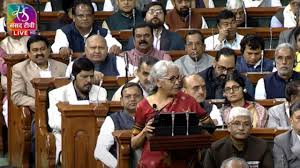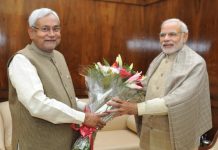The budget’s impact on national politics could be significant, as even the states governed by the BJP — in addition to those ruled by the INDIA alliance — are piqued by the huge allocations made to Andhra Pradesh and Bihar By Dr. Anil Singh

The first budget of the NDA Government at the Centre under the prime ministerial leadership of Narendra Modi and presented by Finance Minister Sitharaman on July 23, at the outset seems to have drawn a mixed bag of reactions from sections of Indian society. The budget has been hailed by the BJP, the principal constituent of the NDA government, as well as other NDA allies, as paving the way for the progress and development of an advanced India. In contrast, the non-NDA parties, principally the INDIA Alliance partners, have denounced it as a flawed document that holds out very little hope for almost all sectors of Indian society except the ultra-wealthy.
It is reported that the proposed budget has pegged some measures and strategies aimed at boosting economic growth, infrastructure, and social welfare. The budget is anchored to four main areas: agriculture, health, education, and infrastructure. Resource allocations are made across different ministries and departments to help them in the pursuit of their respective needs and objectives. Notably, 3.4 percent of India’s GDP is reserved for infrastructure. It was Finance Minister Nirmala Sitharaman’s seventh consecutive budget, and that is a new milestone. BJP followers saw this continuity as providing a stable environment for the continuous execution of policies.
Mixed Reactions
The Budget 2024-25 has attracted different types of reactions from different political groups. The BJP and key NDA partners hailed the Budget as quite visionary, more so for its segment dealing with enhancing productivity and resilience in agriculture, generation of employment, skill development, and services for stimulating economic growth and creating opportunities. Indeed, the attention given within the budget to rural development, infrastructure initiatives, and job creation has been very well-received. The Opposition has termed the budget a political eyewash. It said that the main motto behind it is to appease the two main allies of the BJP—Janata Dal-United and Telugu Desam Party—and the more serious concerns like rising unemployment and inflation have been simply ignored in the budget. Some Opposition leaders have even termed it a “kursi bachao” budget.
The Finance Minister presented a massive budget for Bihar, due to go to Assembly polls next year. He also made provisions in the outlay for a host of infrastructure projects, including expressways and a power plant, heritage corridors, and new airports. Massive support was given to Andhra Pradesh, ruled by the Telugu Desam Party. Only time will tell what the actual impact of the budget will be, and it will depend upon how well it is executed and how the gains are distributed.
The INDIA Alliance has termed the 2024-25 union budget of India unbalanced and biased toward some particular states. The latest agitation in the Parliament yard brought out the sentiments of anger over the thrust in resource allocation and priorities reflected in the budget. It feels the budget unreasonably favors some states at the cost of others and lobbies for redistribution to attend to the needs of various regions. A further illustration is that, according to the alliance, the budget contains very scant provisions for social welfare programs, in particular, education, health, and poverty alleviation. The INDIA Alliance has been continuously working toward impressing upon the recognition of proper inclusive policies for the cause of the marginalized sections of society.
The alliance is highly disappointed that the budget has put such strong emphasis on infrastructure projects, particularly in states with impending elections. They further argue that while infrastructure development is one of the main priorities, it cannot be done at the cost of other equally important sectors. INDIA Alliance is highly dissatisfied with the fact that this budget does not at all reflect the urgency to deal with climate change mitigation or Sustainable Development Goals. It demands more robust environmental policies and investments in renewable energy. The INDIA Alliance feels that the budget has miserably failed to address some of the very important issues and calls for a more rounded and comprehensive approach.
Budgetary impact
The effect of the 2024-25 budget, according to the view of many experts, is going to be huge on India’s economy in times to come. A plan for “Viksit Bharat” or “Developed India” focuses on economic growth, infrastructure, and social welfare. It has clear allocations to such important sectors as agriculture, health, education, and infrastructure. Besides, this refurbished personal income tax regime eases the middle class through a reduction in tax rates and an increase in standard deductions for salaried employees and pensioners. The budget doles out Rs 2 lakh crore over five years on employment-related incentives with a special focus on first-time employees, skill development, and support to employers for providing opportunities to 4.1 crore youth.
Besides, the Rs 11.11 lakh crore long-term infrastructure outlay would support economic growth. Other allocations include Rs 2.66 lakh crore for rural development with the thrust on containing rural distress and unemployment. The abolition of the “angel tax” was carried out for all classes of start-up investors. Other sops include a rationalized capital gains tax and slashing customs duty on mobile phones and gold. It also announced financial support to two states—Andhra Pradesh and Bihar—both ruled by allies of the BJP—for infrastructure projects. For Bihar, where Assembly elections are scheduled for the next year, the Centre has lined up investments in expressways, power plants, heritage corridors, and airports. However, fast the economy of India might have grown; the distributive pattern has been lopsided. Such inequalities would be worked out through policies and investment measures for “Inclusive Growth with Employment and Sustainable Development”.
Political fallout
The impact on national politics could be huge because states ruled by the BJP and those not ruled by the BJP are both aggrieved over the allocations made in favour of Andhra Pradesh and Bihar. It could also put the BJP-led NDA government in a difficult position in the assembly elections that are expected in Haryana, Maharashtra, and Jharkhand. Controversial budget allocations, especially in states like Haryana and Maharashtra, could further dent BJP’s influence. Moreover, many a time, questions are raised over the exact allocation of budget funds, like in the case of defence; there are arguments regarding the percentage to be allotted for social programs like health and education.
The budget certainly makes provisions for infrastructure development, but discussions remain on how to identify priority projects. Concerns include effectiveness and transparency in infrastructure spending. Provision for responding to climate change, promotion of renewable energy, and protection of the environment is contested. While many would want more appropriations, others fear a negative economic impact. Moreover, there is foreign aid for other countries, raising debates as to whether appropriations of this nature are necessary or effective in any way. Some critics demand that the aid should be made conditional on certain conditions or other reforms. It should also be noted that, more often than not, these controversies arise because of differences in political ideologies and priority attention. Indeed, with the intrinsic nature of the budget process, convergence can be quite challenging to attain.
(The columnist is Executive Editor of India Ahead news channel.)











